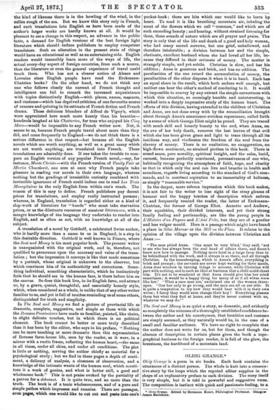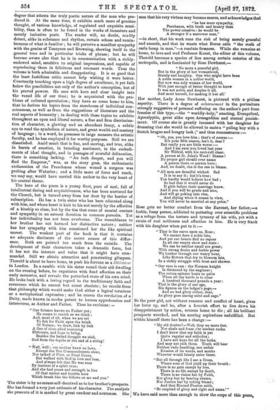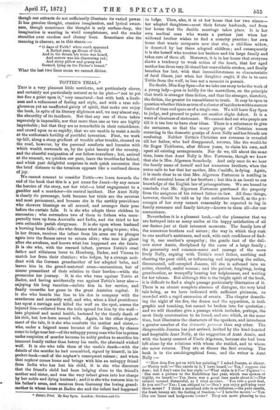OLRIG GRANGE.*
Olrig Grange is a poem in six books. Each book contains the utterances of a distinct person. The whole is knit into a consecu- tive story by the loops which the reputed editor supplies in the shape of an explanatory preface to each division. The story itself is very simple, but it is told in powerful and suggestive verse. The composition is instinct with quick and passionate feeling, to a * Olrig Grange. Edited by Sermann Kunst, Philological Professor. Glasgow James Idaelehoee. degree that attests the truly poetic nature of the man who pro- duced it. At the same time, it exhibits much more of genuine thought, of various knowledge, of regulated and exquisite sensi- bility, than is often to be found in the works of immature and merely imitative poets. The reader will, no doubt, readily detect, alike in substance and rhythm, certain echoes and remin- iscences of what is familiar ; be will perceive a manifest sympathy with the genius of Tennyson and Browning, showing itself in the general tone and in particular tricks of phrase ; but he will become aware also that he is in communication with a richly- endowed mind, sensitive to original impressions, and capable of reproducing them in felicitous and resonant words. Thus the volume is both admirable and disappointing. It is so good that the least fastidious critic cannot help wishing it were better. Constantly touching upon a high degree of excellence, it yet falls below the possibilities not only of the author's conception, but of his proved powers. He sees with keen and clear insight into the vexed life of our time; he is acquainted with the pro- blems of cultured speculation ; they have so come home to him, that he derives his topics from the storehouse of individual con- sciousness, as well as from the suggestions of literature and the real aspects of humanity ; in dealing with these topics he exhibits throughout an open and liberal nature, a fine and firm discrimina- tion of character, a glowing and an abundant fancy, a subtle eye to read the symbolism of nature, and great wealth and mastery a language ; in a word, he possesses in large measure the artistic faculty, and he has employed it for worthy purposes. Still we are dissatisfied. Amid much that is fine, and moving, and true, alike in bursts of emotion, in brooding sentiment, in the embodi- ments of ideal thought, and in passages of scornful delineation, there is something lacking. "An inch deeper, and you will find the Emperor," was, as the story goes, the enthusiastic exclamation of the Frenchman whose wound a surgeon was probing after Waterloo ; and a little more of force and reach, we may say, would have carried this author to the very heart of his central theme.
The hero of the poem is a young Scot, pure of soul, full of intellectual daring and acquisitiveness, who has been nurtured for the Church, but is turned away from her door by the barrier of -subscription. He has a twin sister who has been educated along with him, and whose heart is knit to his not merely by the affinities of a kinship so close, but by the ties that come of mental contact and sympathy in an earnest devotion to common pursuits. Yet her individuality has not been overborne. The resemblance to her brother has not harmed her distinctive nature ; neither as her sympathy with him occasioned her the like spiritual
unrest. The weakest part of the book is that it contains no adequate disclosure of the secret causes of this differ- ence. Both are painted too much from the outside. The development of their characters takes a dramatic form, but it has not the interest and value that it might have com- manded. Still we obtain attractive and penetrating glimpses. Thorold is about to leave home, to push his fortune as a litterateur in London. In a ramble with his sister round their old dwelling on the evening before, he expatiates with fond affection on their early memories, and reveals the perturbed state of his own mind. He looks back with a loving regard to the traditionary faith and reverence which he cannot but count obsolete ; he recoils from that philosophy which would make God either a logical terminus or a metaphorical expression ; and he craves the revelation of a Deity, made known in modes patent to human apprehension and intercourse, as Author and Father. Thus he exclaims : — 'Our Science knows no Father yet ;
He seems to vanish as we think ; And, most of all, when we are set To fish for Faith upon the brink Of Nature ; we draw, link by link A line of close-plied reasoning Elaborate, and hope to bring, Besides the baited thought we sink, God from the depths at the end of a string!
"Well, woll ; our mother knew no laws,
Except the Ten Commandments clear, Nor talked of First, or Final Cause, But walked with God in love and fear, And always felt that He was near By instinct of a spirit true; And she had peace and strength in lien Of that unrest and trouble here Which break like the billows on me and you."
The sister is by no means self-deceived as to her brother's prospects. She has formed a very just estimate of his character. The analysis she presents of it is marked by great candour and acuteness. She
sees that his very virtues may become snares, and acknowledges that
"he has more sympathy, Perchance, with truth and beauty than The power creative : he would be A stronger if a narrower man,"
—in short, that his work runs the risk of being merely graceful and smooth, and that he wants what Burns calls "the stalk of carle hemp in man,"—a resolute firmness. While she remains at home, to love and wed Professor Kunst, the editor of this volume, Thorold becomes a species of lion among certain coteries of the metropolis, and is fascinated by Rose Dewhurst,—
" No more a graceful girl,
Bat in the glory of her womanhood,
Stately and haughty. One who might have been
A noble woman in a nobler world, But now was only woman of her world, With just enough of better thought to know It was not noble, and despise it all,
And most herself, for making it her all'
Her mother, Lady Anne Dewhurst, is pictured with a pitiless asperity. There is a degree of acharnement in the portraiture strongly suggestive of personal suffering on the author's part from females of this type,—the " worldly-holy," exacting, Evangelical, Apocalyptic, great alike upon Armageddon and eternal punish- ment. Of course she is greatly incensed with her daughter for dreaming that she would be allowed to mate a "puling boy with a Scotch brogue and hungry look ;" and thus remonstrates :—
" Oh, yes, you love him ; that's of course :—
It's your fifth season, isn't it, dear?
But really you are little worse :-
And I am sure you loved last year
Sir Wilfrid, with his rent-roll clear.
A person at St. John's Wood ! Shame!
No proper girl should ever name
A person there or person here ; And, no doubt, she is the one to blame.
"All men are dreadful wicked. Sad It is to say it; but it's true ; You hardly would believe how bad ; So bad that it would never do If girls before their marriage knew.
And if you will be prude and nice, And will go poking into vice, And shying when it comes in view,
You will never be married at any price."
Rose gets no better comfort from the Baronet, her father, —a feeble, fussy person, addicted to pottering over scientific problems as a refuge from the torture and tyranny of his wife, yet with a strain of real nobleness and affection in him. He is very frank with his daughter when put to it:— " That is the curse upon us, Rose ;
We cannot dare a noble fate, And yet our hearts find no repose In all our empty show and state : We can be neither small nor great ; With strong desire and feeble power We hanker through our weary hour, Like flowers that try to blossom late,
In a sickly struggle with frost and shower.
"Our race is run : the Norman knight Is distanced by the engineer ;
The cotton-spinner beats us quite When all the battle is to clear
A hundred thousand pounds a year :
That is the glory of our age, Six figures on the ledger's page,— And no bad glory either, dear,
As glory goes among saint and sage."
So the poor girl, not without remorse and conflict of heart, gives her lover up, and he, after a feverish effort to live down his disappointment by action, returns home to die ; all his brilliant prospects wrecked, and his soaring aspirations unfulfilled. But within himself there has been a change :— "My old doubts?—Well, they no more fret.
Nor chafe and foam o'er sunken rocks. I don't know that my faith is yet Quito regular and orthodox; I have not keys for all the locks, And may not pick them. Troth will bear Neither rude handling, nor unfair Evasion of its wards, and mocks Whoever would falsely enter there.
"But all through life I see a Cross,
Where sons of God yield up their breath :
There is no gain except by less, There is no life except by death,
There is no vision but by Faith, Nor glory but by bearing shame, Nor Justice but by taking blame ; And that Eternal Passion saith,
Be emptied of glory and right and name.'"
We have said more than enough to show the scope of this poem, though our extracts do not sufficiently illustrate its varied power. It has genuine thought, creative imagination, and lyrical sweet- ness, though sometimes the thought is only surface-deep, the imagination is wanting in vivid completeness, and the reader stumbles over careless and clumsy lines. Sometimes also the meaning is obscure, as in this stanza :—
"0 days of Faithl when earth appeared A Bethel sure, an House of God,
And In the dreamlis voice was heard, And sorrow was his chastening rod ; And stony pillow and grassy sod Seemed, lying on the Father's breast."
What the last two lines mean we cannot divine.




































 Previous page
Previous page